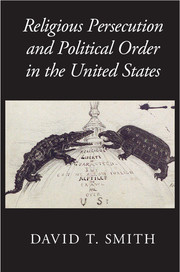Book contents
- Frontmatter
- Dedication
- Contents
- Acknowledgments
- 1 Introduction
- 2 Religious freedom and persecution in America: A theoretical overview
- 3 Joseph Smith and the rise of Mormonism: The political threat of religious charisma
- 4 The federal response to Mormonism
- 5 Jehovah's Witnesses and the flag salute, 1870–1940
- 6 Mass violence against Jehovah's Witnesses, 1940–1942
- 7 The Catholic experience in America
- 8 The Jewish experience in America
- 9 The Islamic experience in America
- 10 Conclusion
- Sources and bibliography
- Index
4 - The federal response to Mormonism
Published online by Cambridge University Press: 05 November 2015
- Frontmatter
- Dedication
- Contents
- Acknowledgments
- 1 Introduction
- 2 Religious freedom and persecution in America: A theoretical overview
- 3 Joseph Smith and the rise of Mormonism: The political threat of religious charisma
- 4 The federal response to Mormonism
- 5 Jehovah's Witnesses and the flag salute, 1870–1940
- 6 Mass violence against Jehovah's Witnesses, 1940–1942
- 7 The Catholic experience in America
- 8 The Jewish experience in America
- 9 The Islamic experience in America
- 10 Conclusion
- Sources and bibliography
- Index
Summary
INTRODUCTION
After the Mormon exodus to Utah, anti-Mormonism took on much more ideological and partisan dimensions. It was no longer simply about conflicts between Mormons and their non-Mormon neighbors, or the suspicion that Mormon leaders were perpetrating a fraud. Anti-Mormonism became a foundational crusade for the fledgling Republican Party, which associated polygamy with slavery. Republican Party anti-Mormonism united Whig and nativist demands that religious minorities be “Americanized” with feminist and liberal concerns about the captivity to which Mormon women were supposedly subjected. Just as importantly, the Mormons during this period occupied a vast and otherwise largely unoccupied territory in the west, which brought them into direct conflict with the federal state. From the 1850s to the 1880s, the increasingly autonomous Mormon polity in the west posed a threat to a succession of American state-building projects.
This chapter examines the federal response to Mormonism between 1847 and 1896, with a particular focus on the Edmunds Act of 1882, which I analyze through both congressional debates and voting patterns. There are several reasons for focusing on Edmunds in particular, the most important of which is that it is a rare example of a democratic government voting explicitly to deprive one section of the population of its political rights. The extensive debates around the act allow us to reconstruct the rationale for state repression, while the voting record gives us an idea of the incentives of individual legislators to support or oppose repression. The Edmunds Act also poses an important puzzle: Why did so many Democrats support the Republican anti-Mormon agenda, even when it would hurt Democrats electorally?
The Edmunds debate and vote show the limits of pluralistic and legalistic perspectives on the relationship between religion and the state in America. The Mormons were unable to marshal the support of the Democratic Party, traditionally the party of religious minority rights, despite the political opportunity this would have given the Democrats in Utah territory. And the repression of Mormon rights did not simply reflect a limited nineteenth-century understanding of religious freedom. The arguments used by those Democrats who did defend Mormon rights were couched in terms that would be extremely familiar to twentieth- and twenty-first-century civil libertarians.
- Type
- Chapter
- Information
- Publisher: Cambridge University PressPrint publication year: 2015



